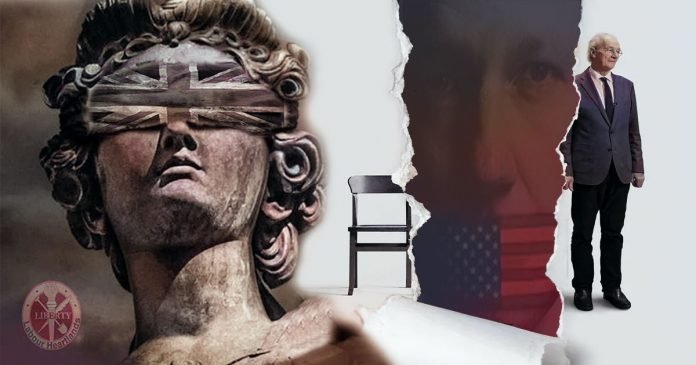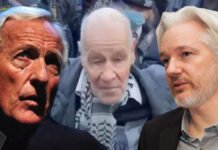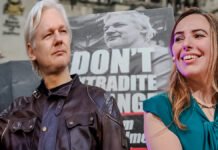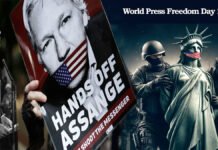Julian Assange’s father, John Shipton, was in Berlin for the German premiere of the documentary where he talked about the latest developments surrounding his imprisoned son.
The first scene of the documentary “Ithaka,” which celebrated its German premiere at the Human Rights Film Festival Berlin, shows police carrying WikiLeaks founder Julian Assange out of the Embassy of Ecuador in London and into a high-security vehicle on April 11, 2019.
Dodging an international arrest warrant, Assange had spent seven years without leaving the London embassy. But he was arrested shortly after Ecuadorian authorities revoked his political asylum due to a set of disputes.
Since then, Assange has been jailed in Belmarsh, one of the UK’s highest security prisons.
Facing a 175-year sentence for espionage

WikiLeaks was launched in 2006, and the Australian editor’s platform gained international attention four years later, following the publication of a trove of leaks provided by whistleblower Chelsea Manning, a former US Army intelligence analyst. The classified material, which included videos, suggested that the United States was hiding proof of war crimes committed in Afghanistan and Iraq.
Assange was initially charged with conspiring to hack into a government computer — a charge that comes with a maximum five-year sentence. But in May 2019, he was also charged with violating the Espionage Act. The new indictments mean the WikiLeaks publisher now faces a 175-year sentence.
Several human rights organizations have criticized those charges, saying they are an attack on freedom of the press, guaranteed in the US by the constitution’s First Amendment.
But before being tried for those charges, the US needs to obtain Assange’s extradition from the UK.
“Ithaka,” directed by Ben Lawrence, follows the campaign to free Assange ahead of the extradition proceedings.
At the centre of the film are members of his family, including Stella Moris, Assange’s spouse and mother of the two young children they conceived together during his time in the Ecuadorian Embassy, as well as Assange’s father, John Shipton, who leaves his home and family in Australia to fight for his famous son’s release.
Shipton, a house builder and anti-war activist, was not involved in Julian Assange’s life as a child, but reestablished contact when his son became an adult. Documentary filmmaker Ben Lawrence attempts to better understand their relationship, but Shipton refuses to dwell on the past, preferring to focus on the main issue: freeing his son.
“I don’t much like the media, but it seems as though this is an avenue where I can contribute,” he says in the film.
Present in Berlin for the German premiere of the film at the Human Rights Festival, Shipton also came to DW’s news studio for an interview, where he summarized what he hopes the Australian government will achieve in his son’s case, as they are now holding private talks with the Biden administration.
“I would hope they ring me up and say, ‘Can you go to the airport and pick up Julian?’ — that’s my practical hope,” he said, adding that he does not see it as his role to personally negotiate with US Department of State.
A public narrative to discredit Assange
Beyond Julian Assange’s family campaigning for his release, the documentary also features another important voice of authority, Nils Melzer, then UN Special Rapporteur on Torture and Human Rights Chair at the Geneva Academy, who was contacted by Assange’s legal team to investigate the case.
As Melzer says in the film, his initial reaction to the team’s request for protection was, “no, I’m not going to get into this.” But he later realized that this was an emotional reaction based on prejudice he wasn’t even aware he had.
“Why am I admitting to my prejudice? Because I think all of us had them at some point,” Melzer says in “Ithaka.” “Because this is the public narrative that has been spread in the media for 10 years.” And no one who hasn’t been in close contact with Assange “has been able to actually see how much deception there is.”
Assange was accused of rape in Sweden in August 2010.
Assange was arrested in his absence and wanted for questioning in relation to accusations against him of rape and sexual molestation.
It was assumed that if he went to the Scandinavian country to face preliminary questioning, he would ultimately be extradited to the US from there.
Meanwhile, Melzer’s 2019 investigation into the rape allegations led him to come to the conclusion that evidence was manipulated for political reasons. The Swedish legal proceedings against Assange were dropped in November 2019.
“Don’t you dare get cold feet“
As DPP, Sir Keir Starmer tempered his supposed love of liberty by fast-tracking the extradition of Julian Assange (a process now making its way through the courts). He flouted legal precedents by advising Swedish lawyers not to question Assange in Britain: a decision that prolonged the latter’s legal purgatory denied closure to his accusers in Sweden and sealed his fate before a US show trial.
Leaked emails from August 2012 show that, when the Swedish legal team expressed hesitancy about keeping Assange’s case open, Sir Keir’s office replied: ‘Don’t you dare get cold feet’.
Documents released under Freedom of Information requests to Italian magazine La Repubblica confirm the very close relationship between the Crown Prosecution Service (CPS) and Sweden in the Julian Assange case. The files contain hundreds of mostly redacted emails sent over a five-year period.
But according to one authoritative source, the number of CPS documents relating to the case may be much greater than has so far been disclosed.
In May 2017, the Swedish authorities announced they had ceased all remaining investigations into an alleged sexual assault by WikiLeaks founder Assange. But the Metropolitan Police arrest warrant for skipping bail would remain in force. Subsequently, Assange’s legal team sought a ruling that the Met warrant should be rescinded, but the court ruled otherwise.
Chief Magistrate hearing the Assange case: Baroness Emma Arbuthot, married to Baron Arbuthot, former British Conservative Party MP & Chairman of the Defence Select Committee. Yes of course the judiciary is completely independent in the UK.
Gasps in public gallery as judge says Assange can ‘leave the (Ecuadorian Embassy) whenever he likes, have unlimited visitors unsupervised, can choose when he eats, sleeps and exercises’. She’s knocking down most of Assange case to have arrest warrant dropped #Assange
#WIKILEAKS— LISA MILLAR (@LISAMILLAR) FEBRUARY 13, 2018
CPS intervention
The emails between the Swedish Prosecuting Authority (SPA) and the CPS show that the latter was closely involved in the Assange case at every stage.
In one such email, dated 25 January 2011, a CPS lawyer advised the SPA not to send someone to the UK: “My earlier advice remains, that in my view it would not be prudent for the Swedish authorities to try to interview the defendant [Assange] in the UK.“
In August 2012, in response to an article saying Sweden could withdraw the warrant against Assange, a CPS staffer (name redacted) warned [pdf, p1] Sweden’s Director of Public Prosecutions Marianne Ny: “Don’t you dare get cold feet!!!“
But a year later, in October 2013, NY wrote [pdf, p332]: we have found us to be obliged to consider to lift the detention order… and to withdraw the European arrest warrant. If so this should be done in a couple of weeks. This would affect not only us but you too in a significant way.
However, it took three and a half more years for that to happen.
Edward Fitzgerald QC said in court that Assange is ‘anti-war and anti-imperialist’ and this is why the US is out to get him.
Freedom of the press
For the human rights expert, the US case against the WikiLeaks publisher “is a huge scandal and represents the failure of Western rule of law. If Julian Assange is convicted, it will be a death sentence for freedom of the press.”
Even though risks related to Assange’s mental health and of suicide have been assessed, he remains imprisoned in Belmarsh. The extradition proceedings are still ongoing.
On October 13, the European Parliament announced that Assange was among the finalists for its Sakharov Prize for Freedom of Thought, awarded to individuals and organisations defending human rights.
Such support around the world is one thing that keeps Assange going, his father John Shipton added that he gathers that his son still has a sense of hope, “because he’s still with us. And without hope we disappear off the Earth very quickly.”
The Human Rights Film Festival Berlin, where “Ithaka” can be seen in theatres and as a stream, runs until October 23, 2022.
First published by DW News Edited by Brenda Haas re-edited for the UK by Paul Knaggs
Help Us Sustain Ad-Free Journalism
Sorry, I Need To Put Out the Begging Bowl
Independent Journalism Needs You
Our unwavering dedication is to provide you with unbiased news, diverse perspectives, and insightful opinions. We're on a mission to ensure that those in positions of power are held accountable for their actions, but we can't do it alone. Labour Heartlands is primarily funded by me, Paul Knaggs, and by the generous contributions of readers like you. Your donations keep us going and help us uphold the principles of independent journalism. Join us in our quest for truth, transparency, and accountability – donate today and be a part of our mission!
Like everyone else, we're facing challenges, and we need your help to stay online and continue providing crucial journalism. Every contribution, no matter how small, goes a long way in helping us thrive. By becoming one of our donors, you become a vital part of our mission to uncover the truth and uphold the values of democracy.
While we maintain our independence from political affiliations, we stand united against corruption, injustice, and the erosion of free speech, truth, and democracy. We believe in the power of accurate information in a democracy, and we consider facts non-negotiable.
Your support, no matter the amount, can make a significant impact. Together, we can make a difference and continue our journey toward a more informed and just society.
Thank you for supporting Labour Heartlands












